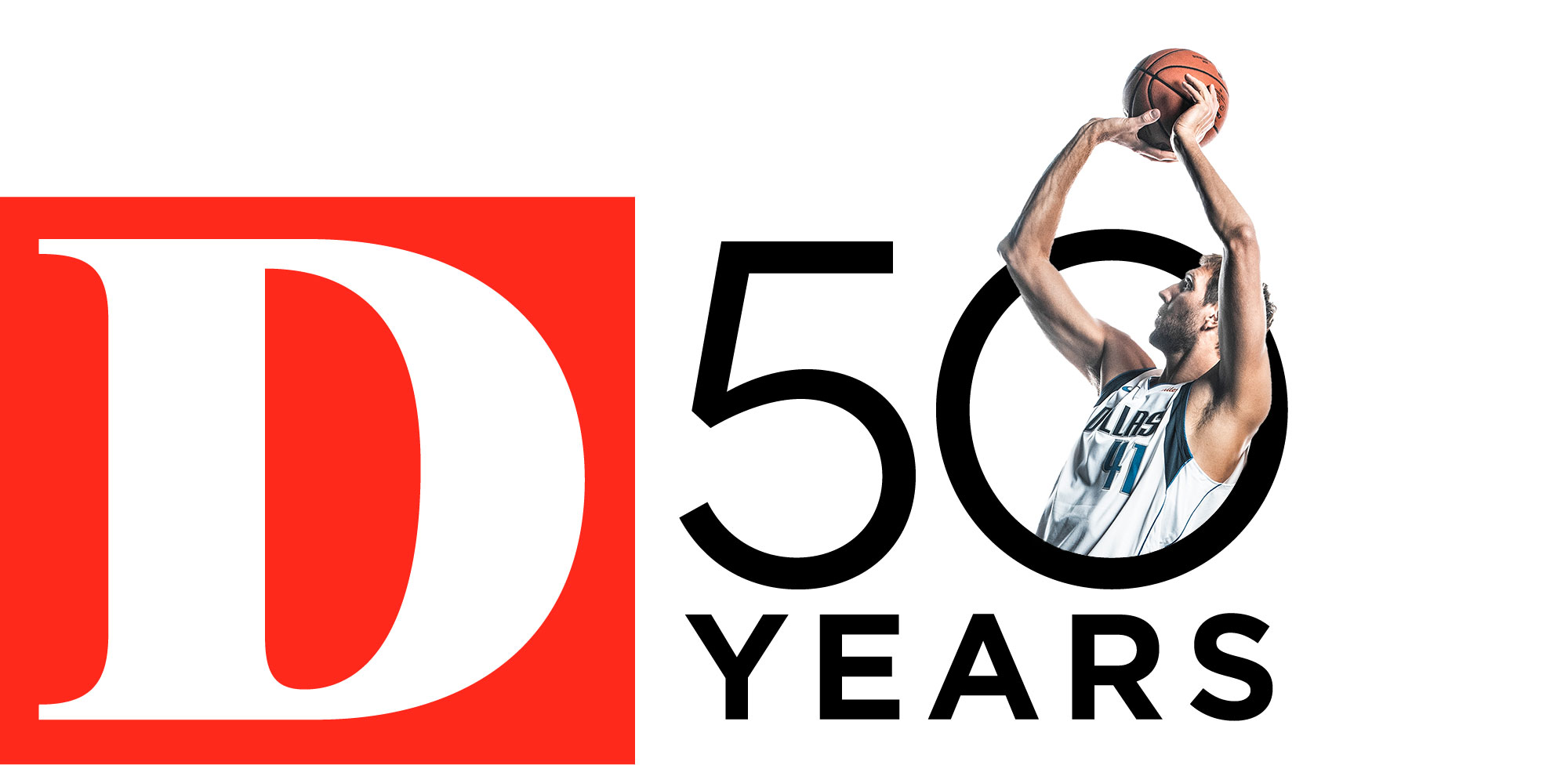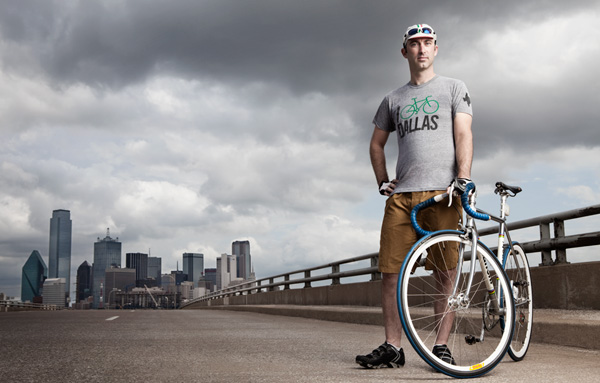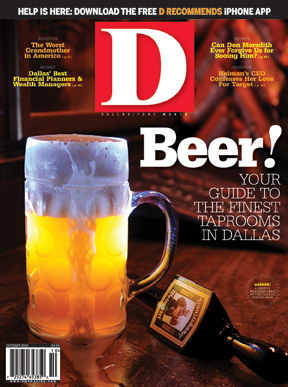Our bicycles slowly ascend the southwestern crest of the Commerce Street bridge, where it merges with downtown-bound traffic from Beckley Avenue. The cars roar past at 50 miles per hour, only a few feet from our handlebars. The drivers barely seem to notice as we begin our game of human Frogger.
Jason Roberts, the public face of the counter-culture bicycle movement called Bike Friendly Oak Cliff (BFOC), leads the way. I’m just here on this overcast morning to see what his morning commute is like. He twists around on his bike with a cup of coffee in one hand and an ear-to-ear grin on his face that says, “Welcome to my world, car user!”
Fearing for my life and trying to catch my breath, I look up at the familiar form of the Dallas skyline. Even though I’ve seen its silvery-gray silhouette a thousand times before, it has never looked more beautiful than it does from the seat of my bicycle. You can’t really see the world when you’re surrounded by glass and steel and morning talk radio. It’s this wide-open experience that Roberts and the other founding members of BFOC are using to create a cultural movement, one bicycle convert at a time, as they pedal toward a future Dallas filled with bike lanes and pedestrian-friendly urban centers.
BFOCers explain the conversion experience as a talking horse might if he could describe life without blinders. “Oh, God. You will never want to ride in your car again. I swear to God,” says Jon Fontenot, a high school art teacher who lives in Oak Cliff and bikes to work in Irving. “You can’t get that in a car.”
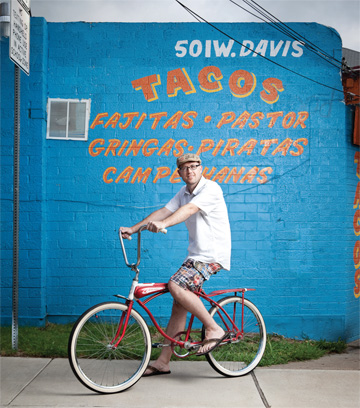
“Dallas is learning that there is a latent demand,” says Scott Griggs, a Dallas lawyer who is an outspoken advocate of alternative forms of transportation and president of the Fort Worth Avenue Development Group. “If you give people an invitation, they will use the infrastructure. If you build a big road, you are going to get cars. If you build a bike lane, you are going to get people biking. Whatever you provide as transportation is what they will use. We’ve given enough invitations, and people like it so much that they are asking for it.”
As an example of this theory in action, Griggs and Roberts point to Portland. Bicycling magazine named Portland the No. 2 bike-friendly city in the United States for 2010. On their 2008 bicycle count, Portland reported bicycles represent 13 percent of all traffic along four bike-friendly bridges (so designated because they have bicycle infrastructure, such as bike lanes, either leading to them or on them). That’s a 322 percent increase at the same locations since 1998, according to Portland’s Bureau of Transportation. At the same time, car trips on the bridges have not increased at all.
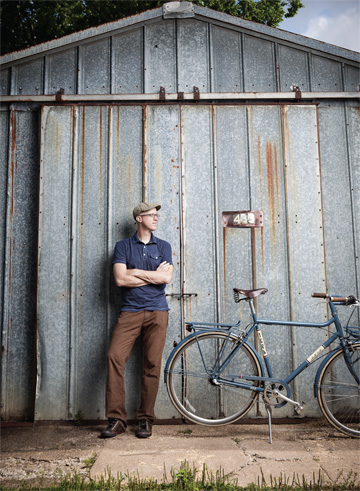
With that in mind, Roberts and some friends began meeting at the Quinn, a now defunct North Oak Cliff bar, to discuss ways to encourage residents to use bicycles as an alternative mode of transportation. They decided to build a culture around bicycling that promoted it as a healthier, more environmentally friendly way to get around the city—but without harping on those attributes. They began organizing group bicycle rides that ended with a stop at a local pub or restaurant. The rides quickly became a way for twenty- to fortysomething urbanites to network.
Bike Friendly Oak Cliff started with a blog, a bright-orange logo, some regular group bike rides, and a handful of North Oak Cliff businesses that gave discounts to customers who arrived via bicycle. Now, nearly two years later, places such as the recently opened gastropub Nova are asking Roberts and BFOC how to attract the bicycle crowd, and a city without a single mile of bike lanes is in the midst of planning an overhaul for a 25-year-old bike plan. The Dallas Observer’s Jim Schutze coined a term for the group in a January column: “bikos.” It doesn’t really fit, and it doesn’t matter. They just are who they are.
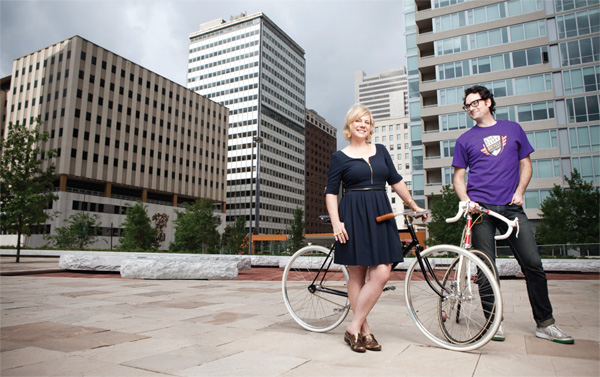
Having survived my commute with Roberts, I head over to the Oak Cliff Bicycle Company. Its modest storefront sits on North Tyler Street, near West Davis. (Though the store was in the process of moving to North Bishop Avenue when D Magazine went to press in early September.) The small shop has a few parking spaces on a one-way street and doesn’t carry a lot of the mainstream bicycling brands. Owners Ean Parsons and Jeremy Ordaz say the place is buzzing with business. Parsons says the shop has a backlog of 10 to 20 bicycles waiting for repair work.
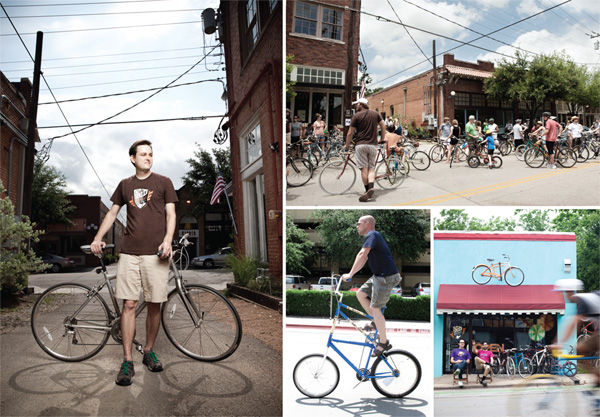
“I think it speaks to the issue of living in a throwaway society,” Parsons says. “Instead of throwing things away, you can recycle and reuse things. With a little bit of elbow grease and determination, old things can be made to run like new.”
It’s the same attitude Roberts preaches when talking about reviving Dallas’ urban centers through a combination of bike lanes and pedestrian-friendly transportation instead of fleeing for greener pastures.
“My friends are leaving for Portland and Austin,” Roberts says. “And I love those cities. Let’s get rid of this mind-set that Dallas just doesn’t do bike friendly. As long as I’m living here I’m going to be fighting every moment I can to make this the kind of place I want to live in.”
Write to [email protected].
